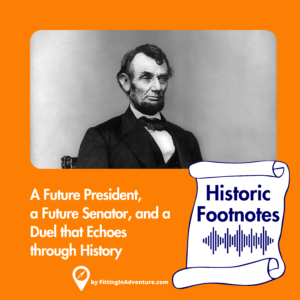If I told you two politicians were so infuriated with one another that one would challenge the other to a duel, you would be forgiven for thinking it is a recent news story. Or, if you realized that no one has publicly challenged anyone to a duel for over 200 years, you might be thinking of Alexander Hamilton and Aaron Burr. In either case, you’d be mistaken. I’m talking about President Abraham Lincoln and Senator James Shields. Of course, this was before either were elected to those offices.
Disclosure: Some links on our site are affiliate links. If you purchase a linked item, we will make a commission, at no extra charge to you.
In August of 1842, the Illinois State Bank went bankrupt. It announced that it would no longer accept its paper currency from private citizens. The only acceptable currency would be gold and silver. Something most citizens did not have. Shields, then the State Auditor, became a target of the opposition party. Lincoln, a self-described “prairie lawyer” at the time, wrote a scathing editorial in the Springfield newspaper about Shields. And because he was friendly with the editor of the paper, he was able to write it under an alias.
Posing as an Illinois farmer and under the pen name Rebecca, Lincoln wrote “’I’ve been tugging ever since harvest getting out wheat and hauling it to the river, to raise State Bank paper enough to pay my tax this year, and a little school debt I owe; and now just as I’ve got it…, lo and behold, I find a set of fellows calling themselves officers of State, have forbidden to receive State paper at all; and so here it is, dead on my hands.’”
Lincoln went on to insult him even more. Calling him a “fool” and a “liar”! He also showed the letter to Mary Todd, his future wife. Mary found it very amusing. A few days later, unbeknownst to Lincoln, she wrote another letter under the pen name Cathleen.
Eventually, Shields had had enough. He stormed into the newspaper office demanding to know who “Rebecca” was. The paper’s editor, Simeon Francis, relented and told him that “Rebecca” was, in fact, Abraham Lincoln.
It’s safe to assume that Lincoln didn’t know who he was insulting. Shields was a fiery Irishman. A few years after this, he would go on to command two brigades in the Spanish-American War as a Brigadier General. He was wounded twice during the war. Once as his horse was shot out from under him. He continued fighting on foot. Leading his men with his sword and remaining on the battlefield until the conclusion of the fight.
When Shields learned the identity of “Rebecca”, he demanded Lincoln print a retraction. He had a handwritten note delivered to Lincoln that said, “I have become the object of slander, vituperation, and personal abuse. Only a full retraction may prevent consequences which no one will regret more than myself.”
Lincoln refused. He returned Shields’s letter with the request that Shields rewrite it in a more “gentlemanly” fashion.
Instead, Shields challenged him to a duel. The challenge put Lincoln in a bad spot. He couldn’t admit to writing the letters Mary Todd had sent, but he couldn’t pass the blame to her, either. Which would make him look like a coward. Reluctantly, he accepted the challenge. They would meet three days later, on September 22nd, 1842, on Bloody Island, Missouri. Where dueling was still legal.
Because Lincoln was the one challenged, he got to choose the weapon and set the rules of the duel. He chose cavalry broadswords of the largest size. Why broadswords? Lincoln later explained, “I didn’t want the damned fellow to kill me, which I think he would have done if we had selected pistols”. On Lincoln’s part, he didn’t want to kill Shields but felt confident he could disarm him with the sword.
As for the rules of the duel, Lincoln assured himself victory because of his distinct height advantage. He stood 6’4” tall to Shields’s 5’9”. The rules were simple. Both men would stand on opposite ends of a ten-foot board. If either man stepped closer, the penalty was death. With Lincoln’s 7” height advantage, he was surely able to reach Shields, but not be reached himself. And while these rules were unsporting, he was well within his rights to set them.
Of course, Shields knew the conditions of the duel made it impossible for him to win, but he was no coward. On the morning of the duel, he arrived ready to proceed with the duel. Whatever the outcome. As was the norm in affairs such as this, the men the combatants chose as their “seconds” tried to negotiate a truce. We don’t know why Shields refused to relent, but he didn’t. So the two men faced off against each other with the plank in between. Lincoln swiped high above Shields’ head and cut through a nearby tree branch. This demonstrated Lincolns’ clear advantage and, with the encouragement of the crowd, both men sought compromise.
Some accounts tell that Lincoln’s “second” hinted to Shields that Lincoln was forced into the duel to protect the honor of a lady. As we know to be Mary Todd. Causing him to accept a toned-down apology. But Lincoln did admit to writing the first letter, adding that he never intended to harm Shields’ character. The duel was called off before Lincoln’s long arms were needed to either disarm or possibly kill, his opponent.
For his part, Lincoln found the whole affair embarrassing and refused to discuss it for the remainder of his life. When asked about it by an Army Officer years later in the Oval Office, Lincoln replied “I do not deny it, but if you desire my friendship, you will never mention it again.”
As for Shields, after he returned from the Spanish-American War, he was nominated by President Polk to be the Governor of the Oregon Territory, which he declined. His reason was to run for the Senate to represent Illinois, which he won, then had to resign from, only to be reelected into the office 9 months later. Why? Because the US Constitution required a foreign-born citizen to be naturalized for 9 years before eligibility. When he was elected, it had only been 8 years and 3 months.
When he came up for re-election, he faced off against Lincoln again. But this time only on the ballot. He was defeated in a three-way runoff election. Now out of office, he moved to Minnesota. When Minnesota achieved statehood in 1858, he served as one of its first two Senators. But only until 1859, when he was defeated in another re-election bid.
He then moved to California until the outbreak of the Civil War where he returned to service at his former rank of Brigadier General. This time, however, he was on the same side as Lincoln. He was wounded for a third time in the Battle of Kernstown but his men delivered General Thomas “Stonewall” Jackson his only tactical defeat of the war. The following day, Lincoln recommended him for promotion to Major General. Symbolically showing that the two men had buried any ill feelings toward one another.
Shields bounced around from San Francisco as the state railroad commissioner, to the Mississippi Valley, and up to Wisconsin before settling in Missouri. The state where he faced Lincoln in a duel nearly 30 years before. He reluctantly ran for Congress in 1868 but was defeated. But served in the Missouri State House of Representatives. In 1879, he was elected to fill the seat left vacant by the death of one of Missouri’s Senators. He served only three months and declined to run for re-election. But this made James Shields the only person to ever serve as a Senator for three different states.
These two very accomplished men’s lives were intertwined for over two decades. Through politics, war, and one incredible duel. I don’t know why this story isn’t very well known. Two American badasses, who go on to be very prominent politicians later, square off against each other with cavalry swords. And because of Lincoln’s exceptional height, strength, and intellect bloodshed is avoided. Incredible!


